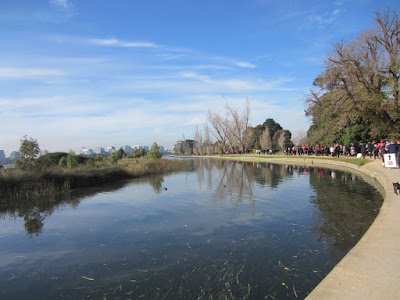In winter 1998, I visited my skiing friend Jan. He impressed me a lot with his work to develop sport in his small village. One of his initiatives was a mountain run on the summer solstice, which coincides with St John's day. It was also his nameday - in Poland nameday is more celebrated than birthday.
At some point he said to me - I would be so pleased if you could one day participate in My race.
I smiled and answered something polite, but my thoughts were somewhere else. Come to Poland in summer? At that time I was preoccupied with skiing, so summer holidays looked quite alien to me.
Participate in 12 km mountain run? Impossible! I had no problem with 90 km ski race, but run? Running was my weakest point.
3 years later, I learned about Jan's tragic death. At the same time, my health cooled down my enthusiasm for ski races. Then the memory came - it might be proper time to please my friend.
The opportunity came in 2008. By this time, I was practically out of any competitive events. My running was terrible, but I knew, that Jan still would be pleased.
On 20th June 2008, I came to Skoczow. In many places I noticed posters announcing the run. Actually it was named after my friend.
Not only the race. Coming to the start area in Jan's village - Pogorze, I noticed that the sport hall and the school bore also his name.
There was nice number of participants. They looked awesome. Eventually I noticed few older guys in T-shirts marked something like - Trotters Club. Maybe this is company for me - I thought and moved closer to listen to their conversations. They discussed events of last week. One participated in half marathon last Saturday, another in 15 km mountain run.
Completely discouraged, I retreated quickly to a distant corner and waited nervously for start.
Start was signaled with a shot of an old cannon and the crowd of runners moved energetically forward.
From the very beginning I positioned myself at the end. For a while, I followed closely a pair of runners. It looked, that the female runner was inexperienced beginner and her partner was coaching her during the run. It was a perfect company for me, I thought. But after 500 m, I gave up. I could not run any more, I slowed to a walk and considered my options.
There is no way, I could cover 12.5 km. Probably the best thing to do, is to withdraw now, when we are so close to the start area. Later it will be a nuisance to get transport back.
I was accompanied by few boys on bicycles, who played the role of rear guard.
- I think, I should withdraw... - I said to them.
- No, you must be joking - they protested and overwhelmed me with encouragements...
- You do not have to hurry.
- We have lots of time.
- You must not give such example to young people.
- Important thing is to finish the race.
- Just after this turn, there is a beautiful meadow, there are lakes, it will be so nice, you have to see it.
So I walked on.
Indeed, soon we reached the meadow. There was smell of fresh grass and of the lakes. I alternated jog and walk and moved slowly on. The last pair of runners was far ahead of me.
From time to time, we passed farms. Around some of them there were people gathered around bonfires. On St John's night, people in Poland celebrate old pagan traditions of Sobotka. They waved to me and encouraged to continue. The course led through meadows, into a forest, up and down few hills. I did not control my time.
A memory of DolomitenLauf, ski race in Austria, came to me.
At the finish line, Jan waited for me (he participated in he half distance race).
- Why you are so late, Lech? - he asked smiling and extending his hand to me - I got cold waiting so long for you.
- Sorry my friend - I thought now - you have to wait for me again. Hopefully, it is not so cold in heaven.
Eventually I recognized familiar surrounding and heard noises of the stadium. I gathered myself to the final jog and entered the stadium.
In the tent for the officials, I noticed a familiar face - the niece of Jan. I met her during my visit 10 years earlier. She recognize me too. It appeared that she was the mayor of Skoczow. How pleased Jan would be with it. We drank glass of vodka for old memories and I moved to the exit.
Passing the school, I noticed few boys sitting at the stairs. I looked again at the commemorative plate. There was a quote from St Paul's letter to Timothy: "I have fought the good fight, I have finished the race, I have kept the faith..."
- Did you finish the race? - asked me the boys.
- I did, I did - I answered and got a feeling that it was a bit more than the race.
 Bieguni by Olga Tokarczuk
Bieguni by Olga Tokarczuk










































